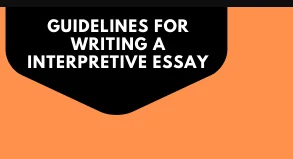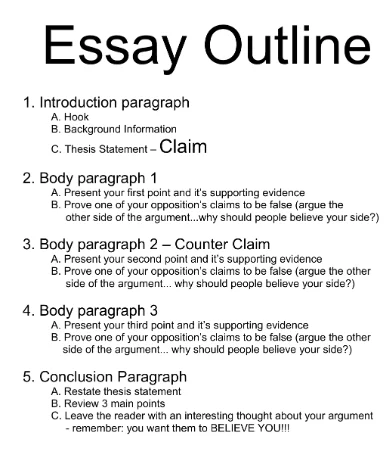Interpretive Essay Topics and Guide How to Write Interpretive Essays

Have you ever thought of discovering what interpretative essays are? Interpretive essays offer perceptive viewpoints and critical analysis, inviting readers to dive into the depths of literature, art, or other disciplines.
In this post, we’ll examine various intriguing interpretive essay topics from this book, such as literary analysis, art critique, and social commentary.
More crucially, whether you are a student exploring literature or an academic thinker researching various issues, this guide will help you master the skill of writing interpretive essays.
What is an Interpretive Essay?

A style of academic writing known as an interpretive essay aims to offer a thorough analysis and interpretation of a specific text, piece of art, occasion, or idea.
Rather than summarizing the subject, it dives into the underlying meanings, ramifications, and relevance.
An interpretive essay’s main objective is to present a well-reasoned interpretation or point of view on the topic at hand.
Interpretive essays cover various subjects, including literature, art, history, philosophy, and more. They require careful research, critical thinking, and the ability to communicate complex ideas effectively to engage readers in a thoughtful exploration of the subject.
Key Characteristics of an Interpretive Essay
- Analysis: Interpretive essays require critically examining the subject to uncover hidden themes, symbols, or messages. This involves breaking down the subject into its components and exploring their relationships.
- Interpretation: The essay should present a clear and well-substantiated interpretation of the subject. This interpretation often involves the writer’s unique perspective and insights.
- Evidence: To support the interpretation, writers use evidence from the subject, such as quotes from a literary work, specific details from an artwork, or historical facts. This evidence helps justify the interpretation.
- Context: Interpretive essays often consider the historical, cultural, or social context in which the subject was created or exists. This context provides a deeper understanding of the subject’s meaning.
How to Write an Interpretive Essay
Writing an interpretive essay can be a rewarding intellectual exercise that allows you to delve deep into a text, artwork, or subject to uncover its underlying meanings and significance.
Here’s a step-by-step guide on how to write an interpretive essay:
1. Choose Your Subject

Select a specific text, artwork, event, or concept to interpret. It should be something that interests you and has enough depth for analysis.
To craft an interpretive essay, select a thought-provoking topic for in-depth analysis and interpretation.
Your chosen subject should be open to multiple perspectives and offer room for critical examination.
Once you’ve chosen your topic, read the source material carefully, taking notes on key details and themes.
Develop a clear and arguable thesis statement that summarizes your interpretation. In the essay, analyze the text, provide evidence to support your interpretation, and offer insightful commentary.
Ensure that each paragraph contributes to your central thesis. Conclude by summarizing your key points and emphasizing the significance of your interpretation.
2. Read/Examine Thoroughly
Carefully read or examine your chosen subject multiple times to familiarize yourself with the details and nuances. Take notes on important passages, details, or elements that catch your attention.
3. Formulate a Thesis Statement
Develop a concise thesis statement summarizing your interpretation or perspective on the subject.
Your thesis should be arguable and offer insight into the subject’s meaning.
4. Gather Evidence
Collect evidence from the subject itself to support your interpretation. Even so, this may include quotes from a text, specific details from an artwork, or historical facts about an event.
Ensure your evidence is relevant to your thesis.
5. Provide Context
Consider the historical, cultural, or social context in which the subject was created. Explain how this context informs your interpretation.
Discuss the background information necessary for your readers to understand the subject.
6. Create an Outline

Organize your essay by creating an outline that includes an introduction, body paragraphs, and a conclusion.
Plan how you will present your evidence and argument logically.
7. Write the Introduction
Begin with a captivating hook or anecdote to engage your readers. Introduce your subject and provide essential context.
Present your thesis statement clearly at the end of the introduction.
8. Develop Body Paragraphs
Each body paragraph should focus on a specific aspect of your interpretation.
Start with a topic sentence that relates to your thesis.
Provide evidence from the subject, followed by an analysis that explains how the evidence supports your interpretation.
Use quotes sparingly and always provide proper citations. Include transitions between paragraphs for smooth transitions.
9. Analyze and Interpret
In your analysis, delve deep into the subject’s details, symbols, themes, or historical context.
Explain why and how your evidence supports your interpretation.
Address counterarguments or alternative interpretations if relevant.
10. Keep the Focus on Your Thesis
Maintaining a strong focus on your thesis is paramount when writing an interpretive essay. Throughout the essay, every paragraph and evidence should directly contribute to and support your thesis statement.
Avoid veering off into unrelated tangents or providing an excessive subject summary. Instead, ensure that your analysis, interpretation, and evidence align with your thesis, reinforcing the central argument you aim to convey.
11. Write the Conclusion
Summarize your key points without introducing new information. Reiterate your thesis and the significance of your interpretation.
End with a thought-provoking closing statement that leaves a lasting impression.
12. Revise and Edit
Review your essay for clarity, coherence, and grammar. Check that your thesis statement remains consistent throughout the essay.

Edit for conciseness and precision in your language. Proofread carefully for errors.
13. Seek Feedback
Share your essay with peers, instructors, or writing tutors to get feedback on your interpretation, argumentation, and writing style.
Consider their suggestions for improvement.
14. Finalize Your Essay
Make any necessary revisions based on feedback. Ensure proper formatting and citation according to your instructor’s guidelines.
15. Proofread One Last Time
Give your essay a final proofread to catch any remaining errors or typos. Remember, writing an interpretive essay requires critical thinking and analysis.
Also, be open to revising your interpretation as you gather evidence and refine your argument. Your goal is to give readers a fresh perspective on the subject and invite them to engage with it in a new way.
30 Interpretive Essay Topics
Interpretive essays offer a wide range of topics for exploration, allowing you to delve into various subjects and provide insightful perspectives.
These interpretive essay topics offer diverse subjects for critical analysis and exploration.

When selecting a topic, consider your interests, the availability of credible sources, and the depth of analysis you can achieve.
Remember that the key to a successful interpretive essay is providing a unique perspective and well-supported interpretation of the chosen subject.
Here are 30 interpretive essay topics covering literature, art, culture, and more:
- Analyze the symbolism of the “green light” in F. Scott Fitzgerald’s “The Great Gatsby.”
- Explore the theme of power and manipulation in George Orwell’s “1984.”
- Interpret the character development of Holden Caulfield in J.D. Salinger’s “The Catcher in the Rye.”
- Examine the role of the supernatural in William Shakespeare’s “Macbeth.”
- Discuss the concept of identity in Toni Morrison’s “Beloved.”
- Analyze the use of color and light in Vincent van Gogh’s “Starry Night.”
- Interpret the social commentary in Banksy’s street art.
- Explore the symbolism of the melting clock in Salvador Dalí’s “The Persistence of Memory.”
- Discuss the feminist themes in Frida Kahlo’s self-portraits.
- Interpret the impact of the Industrial Revolution on society and culture.
- Analyze the symbolism of national flags in different countries.
- Explore the cultural significance of traditional ceremonies or festivals.
- Discuss the evolution of women’s rights in the 20th century.
- Interpret the role of music in the civil rights movement.
- Examine the portrayal of mental health in contemporary media.
- Interpret the effects of social media on interpersonal relationships.
- Analyze the challenges faced by refugees and immigrants in a global context.
- Explore the role of satire in addressing social issues.
- Discuss the impact of consumerism on modern society.
- Interpret the concept of the “trolley problem” in ethical philosophy.
- Analyze the moral dilemmas presented in Albert Camus’ “The Stranger.”
- Discuss the existentialist themes in Jean-Paul Sartre’s work.
- Interpret the philosophy of mindfulness and its applications in daily life.
- Examine the ethical implications of genetic engineering.
- Analyze the ethical considerations of artificial intelligence and automation.
- Interpret the environmental impact of modern agricultural practices.
- Explore the ethical debates surrounding human cloning.
- Discuss the societal implications of the Internet of Things (IoT).
- Examine the philosophy of transhumanism and its vision for the future.
In Conclusion
Throughout this guide, we’ve emphasized the importance of selecting compelling topics, developing clear theses, and supporting interpretations with evidence and analysis.
Interpretive essays offer the chance to interact deeply with a variety of topics. More specifically, it encourages readers to engage in critical inquiry and to make a lasting impression by offering perceptive viewpoints.
As you begin writing your interpretive essay, keep in mind that interpretation is a skill that requires critical thought, rigorous investigation, and a healthy dose of curiosity.
It is an opportunity for you to add your distinctive perspective to the ongoing discussion about the topics that interest and motivate you.
Therefore, embrace the art of interpretation and make your writings sparkle with clarity, depth, and significant insights, whether you’re examining literature, art, culture, or ethics.

Josh Jasen or JJ as we fondly call him, is a senior academic editor at Grade Bees in charge of the writing department. When not managing complex essays and academic writing tasks, Josh is busy advising students on how to pass assignments. In his spare time, he loves playing football or walking with his dog around the park.




